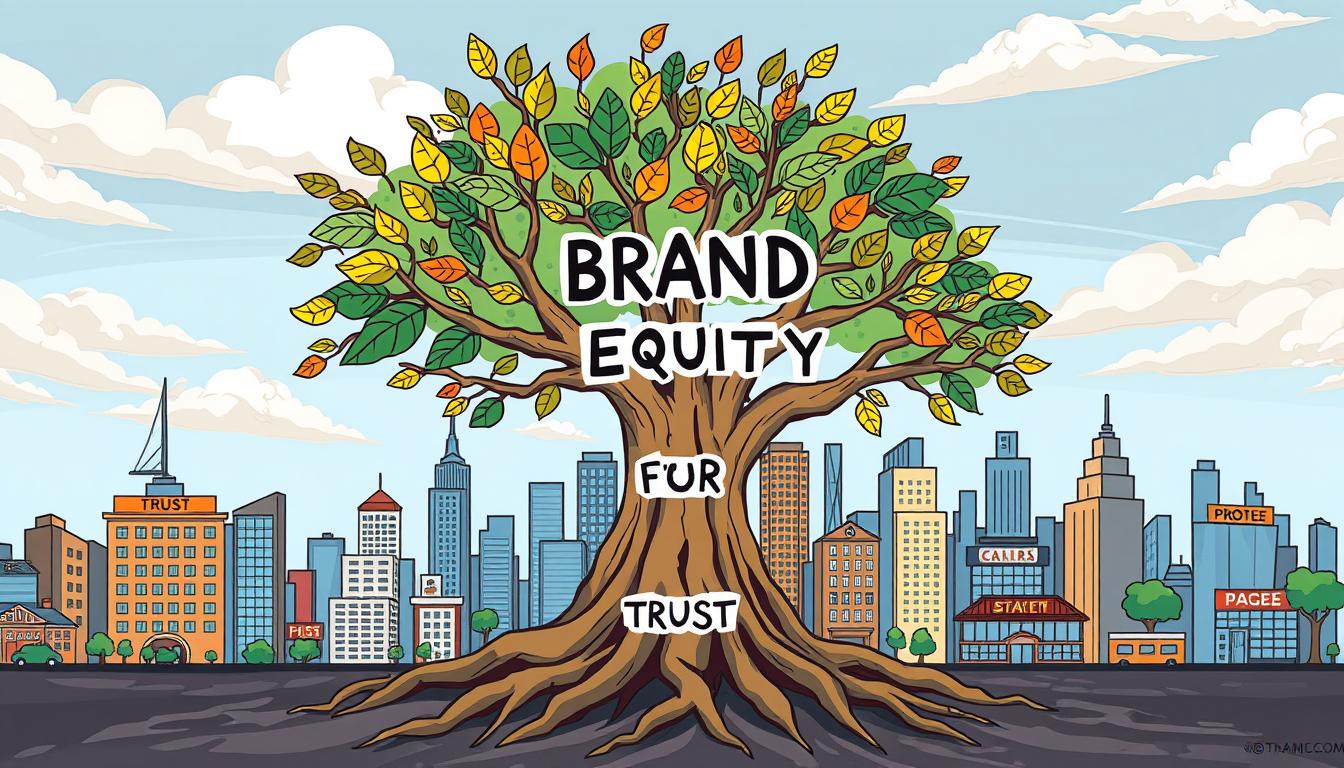In the fast-paced world of business, a company’s brand equity is key. It’s the value a company gets from a product with a known name over a generic one. This value includes how people see the brand, its effects, and how it affects the company’s profits.
Having strong brand equity brings many benefits. It leads to loyal customers, higher prices, more sales, and better profits. Big names like Coca-Cola, Starbucks, and Apple show how powerful brand equity is. They can charge more and stay on top because of their strong reputation and trust from customers.
In today’s digital world, keeping and growing brand equity is more important than ever. Reputation Return offers top-notch ways to protect and boost brand value. They use the latest online reputation management tools to help companies stay strong and trustworthy in the market.
Understanding the Fundamentals of Brand Equity
Brand equity is the value a business gets from its brand name and positive image among consumers. This value can greatly affect a company’s financials, market share, and growth. Businesses that focus on consistent branding see 20% greater overall growth, as shown in Marq’s State of Brand Consistency Report.
Components of Brand Value Creation
Brand equity includes brand awareness, attributes, quality, and loyalty. These parts shape the brand’s value and image in consumers’ minds. Companies with strong brand equity see 33% higher revenue than others.
The Role of Consumer Perception
Consumer perception is key in building brand equity. It affects buying decisions and willingness to pay more. A negative shift in perception can harm a brand, as seen with Meta’s trust score dropping from 16% to 5.6% after rebranding, causing a $650 million valuation loss in a year.
Impact on Business Performance
Strong brand equity can lead to more market share, higher prices, loyal customers, and better finances. In fact, 64% of C-suite executives have tightened procurement processes, as the Edelman-LinkedIn B2B Thought Leadership Impact Report shows. Yet, 91% of decision-makers remain open to non-critical businesses if they can show their value, the same report found.
| Metric | Statistic |
|---|---|
| Thought leadership content consumption | 54% of B2B decision-makers spent more than one hour per week reading thought leadership content in 2021 |
| Revenue boost from online reviews | Joe Kevens, Director of Demand Generation at PartnerStack, highlighted that focusing on online user reviews led to a 40% revenue boost for the company |
| Employee trust in employer | Employees rank trust in their employer 23 points higher than average for other institutions |
| Increase in revenue from improved customer experience | 84% of companies that work to improve customer experience see an increase in revenue |
Building brand equity requires consistent quality, effective marketing, and positive customer experiences. Measuring it involves tracking financials, brand strength, and consumer sentiment.
The Strategic Importance of Brand Recognition
In the world of business, brand equity is key. A strong brand recognition boosts awareness and drives sales and profits over time. This helps companies gain a bigger market share and enjoy the perks of a positive brand image.
Good brand equity comes from being well-known and respected. It means higher profits and a good name for the brand. On the flip side, bad brand equity can hurt a company’s reputation and profits. The main parts of brand equity are brand awareness, brand attributes, perceived quality, and brand loyalty.
Companies like Starbucks, Walmart, and Apple have done well because of their strong brand equity. Their brand recognition, quality, and loyal customers let them charge more and stay ahead in their fields.
For businesses, managing brand equity is vital. It brings many benefits, like more market share, a stronger position, and better finances. A well-managed brand can handle changes in the market and meet new customer needs.
Measuring and Monitoring Brand Equity
To check brand equity, look at financials, customer data, and other key areas. Market research, like focus groups and online polls, helps see how well a brand is doing and how ads are working.
A study of 597 logos showed that descriptive logos are better at getting people to remember a brand than nondescriptive ones. This shows how important it is to have a brand that looks good and stands out.
Companies spend a lot to build brand recognition to keep customers and boost sales. Keeping a consistent brand image everywhere is key for brands wanting to use their good reputation and stay strong in the market.
Building and Maintaining Customer Loyalty Through Brand Value
Creating strong brand equity means focusing on keeping customers loyal. This is done by building emotional connections, gaining trust, and using feedback to improve. These steps help brands grow and stay strong in the market.
Creating Emotional Connections with Customers
Brands need to tell a story that speaks to their customers. They should share values that customers can relate to. This way, brands build a strong bond with their audience. Patagonia is a great example, as it connects with customers through its green values.
Developing Trust and Credibility
Trust is key to lasting customer relationships. Brands must keep their promises and offer quality products. Amazon is known for its reliability, which has earned it a loyal customer base.
Leveraging Customer Feedback for Growth
- Listening to and using customer feedback helps brands improve and innovate.
- By fixing issues and adding new features based on feedback, brands can get better and stay ahead.
- Starbucks‘ Rewards program is a great example of how to use feedback to keep customers coming back.
Keeping customers loyal is crucial for a brand’s success. By connecting emotionally, building trust, and using feedback, brands can create a loyal base. This base is the key to long-term growth and success.
| Metric | Impact on Brand Equity |
|---|---|
| Customer Loyalty Percentage | Strong brand equity directly correlates to higher customer loyalty rates as consumers choose the brand over competitors. |
| Customer Retention Rates | Building brand equity contributes to increased customer retention, reducing churn rates and boosting long-term revenue. |
| Positive Brand Association Percentage | Establishing brand equity leads to a higher percentage of positive associations in consumers’ minds. |
| Customer Satisfaction Rates | Building brand equity is linked to higher levels of customer satisfaction and positive customer experiences. |
Protecting Brand Equity in the Digital Age
In today’s digital world, keeping your brand safe is key. With more online shopping and social media, fake products and brand misuse are common. Good online reputation management and digital brand protection are vital to keep trust and value.
The digital world offers chances and challenges for brands. Online shopping is growing fast, with over 70% of people expected to shop online for groceries soon. This growth shows how important it is to have a strong online presence.
Brands selling online face issues like outdated products. To fix this, working with experts in online sales can help. They can make sure your products look good and are easy to find online.
| Key Considerations for Digital Brand Protection | Benefits of Proactive Measures |
|---|---|
|
|
Reputation Return offers top-notch digital brand protection services. They help businesses keep their brand safe online. By staying ahead of threats, companies can protect their reputation and value in the digital world.
Measuring and Tracking Brand Performance
It’s key to measure and watch how your brand is doing. This helps you understand and boost your brand’s value. By looking at important numbers, using tools, and checking your brand’s health often, you can make smart choices to grow your brand.
Key Performance Indicators
Important things to watch include how well-known your brand is, how loyal your customers are, your market share, and your financial health. For example, a recent report by Statista shows Amazon, Apple, Google, Microsoft, and Walmart are the top brands. Brands with strong equity often see more sales, profits, and stable stock prices, especially when they’re up against tough competition.
Analytics and Monitoring Tools
Tools that give deep insights into how your brand is doing are very helpful. They track what people say on social media, online mentions, customer feedback, and more. By looking at this data all the time, you can spot trends, fix problems, and make smart choices to keep and grow your brand’s value.
Regular Brand Health Assessments
Doing regular checks on your brand’s health, like surveys and focus groups, helps you really get what people think and feel about your brand. This info helps shape plans to get your brand noticed more, keep customers coming back, and use your brand’s good name to your advantage. Brands that keep a close eye on this stuff stay strong and competitive in the market.
| Brand | Brand Value (in billions) | Market Share | Customer Loyalty Rate |
|---|---|---|---|
| Amazon | $299.28 | 18.1% | 92% |
| Apple | $297.51 | 24.7% | 88% |
| $281.53 | 92.6% | 85% | |
| Microsoft | $191.57 | 17.3% | 90% |
How Reputation Return Strengthens Brand Position
Keeping a strong brand reputation is key in today’s digital world. Reputation Return is a top provider of reputation management services. They help companies boost their brand and protect its value.
Reputation Return uses a detailed approach. They focus on brand enhancement through online reputation management and real-time monitoring. They also plan strategic responses. This way, they help businesses keep a good image, handle threats, and grow their brand value.
- Comprehensive online reputation management to mitigate the impact of negative reviews or content
- Proactive brand monitoring to identify and address potential reputation issues before they escalate
- Strategic response planning to quickly and effectively manage brand crises or controversies
- Customized solutions to strengthen brand positioning and increase customer trust and loyalty
A recent AI study highlights the importance of brand reputation and equity. It shows how they help expand brand reach and revenue. Working with Reputation Return, businesses can confidently face the digital world. They can protect their brand’s value and find new ways to grow.
To find out how Reputation Return can help your brand, book a free consultation with an expert today.
Strategies for Crisis Management and Recovery
In today’s digital world, a brand’s reputation is very fragile. A small mistake can quickly turn into a big crisis. This can harm your brand’s value. It’s important to have good brand crisis management and reputation recovery plans to keep your brand safe and successful.
Immediate Response Protocols
When a crisis happens, you must act fast. Quick action is key to lessening the damage. This includes:
- Quickly figuring out the situation and its effects
- Creating a clear and active communication plan
- Acting quickly to fix the problem at its source
By moving quickly and firmly, you show your brand is serious about fixing the crisis. This helps regain trust from your stakeholders.
Long-term Reputation Rebuilding
Fixing a damaged reputation takes time and effort. This might mean:
- Sharing positive content to balance out the negative
- Showing your brand’s values and better practices
- Using customer feedback to show you care
Agood reputation recovery plan helps you win back customer trust. This makes your brand stronger in the market.
Stakeholder Communication Plans
Good crisis management means talking clearly to everyone involved. This includes customers, employees, investors, and the public. By sharing updates and showing you’re committed to fixing things, you can reduce the damage. This keeps trust during the recovery.
Reputation Return helps businesses deal with brand crisis management and reputation recovery. Our team creates detailed plans to protect your brand’s value. We ensure your brand’s success in the long run.
Conclusion
Brand equity is a valuable asset that needs constant care and growth. In today’s digital world, it’s key to manage your reputation well. Reputation Return offers top-notch solutions to protect your brand’s value, handle crises, and build a positive image.
Investing in brand equity protection and using Reputation Return’s skills can help your business grow. It builds customer loyalty and keeps you ahead of the competition. A strong brand equity increases profits and makes your company more attractive to customers, employees, and investors.
The importance of reputation management is huge. Companies that focus on their brand equity can face challenges better, grab new chances, and stay on top in their field. With Reputation Return’s custom solutions, you can protect your brand and achieve lasting success.














